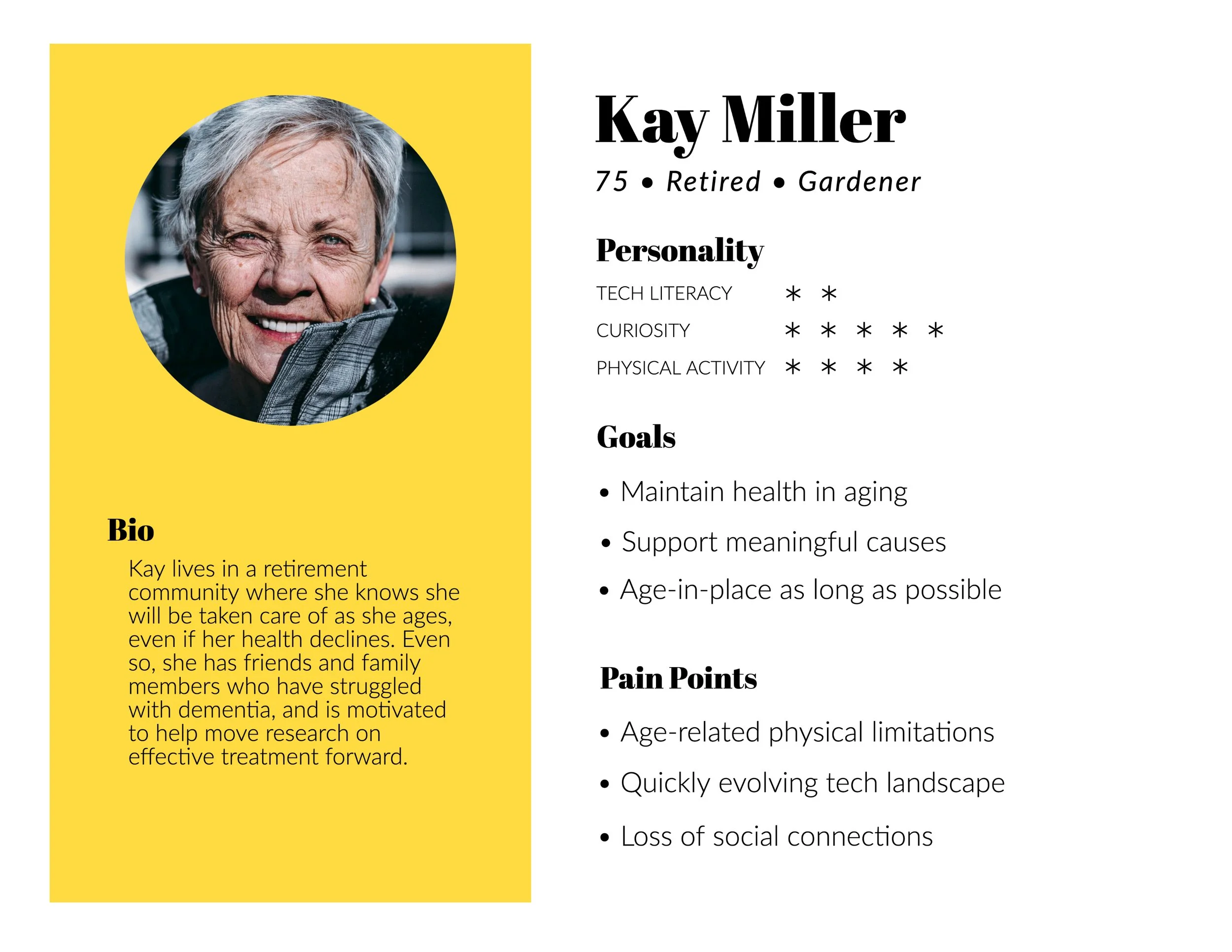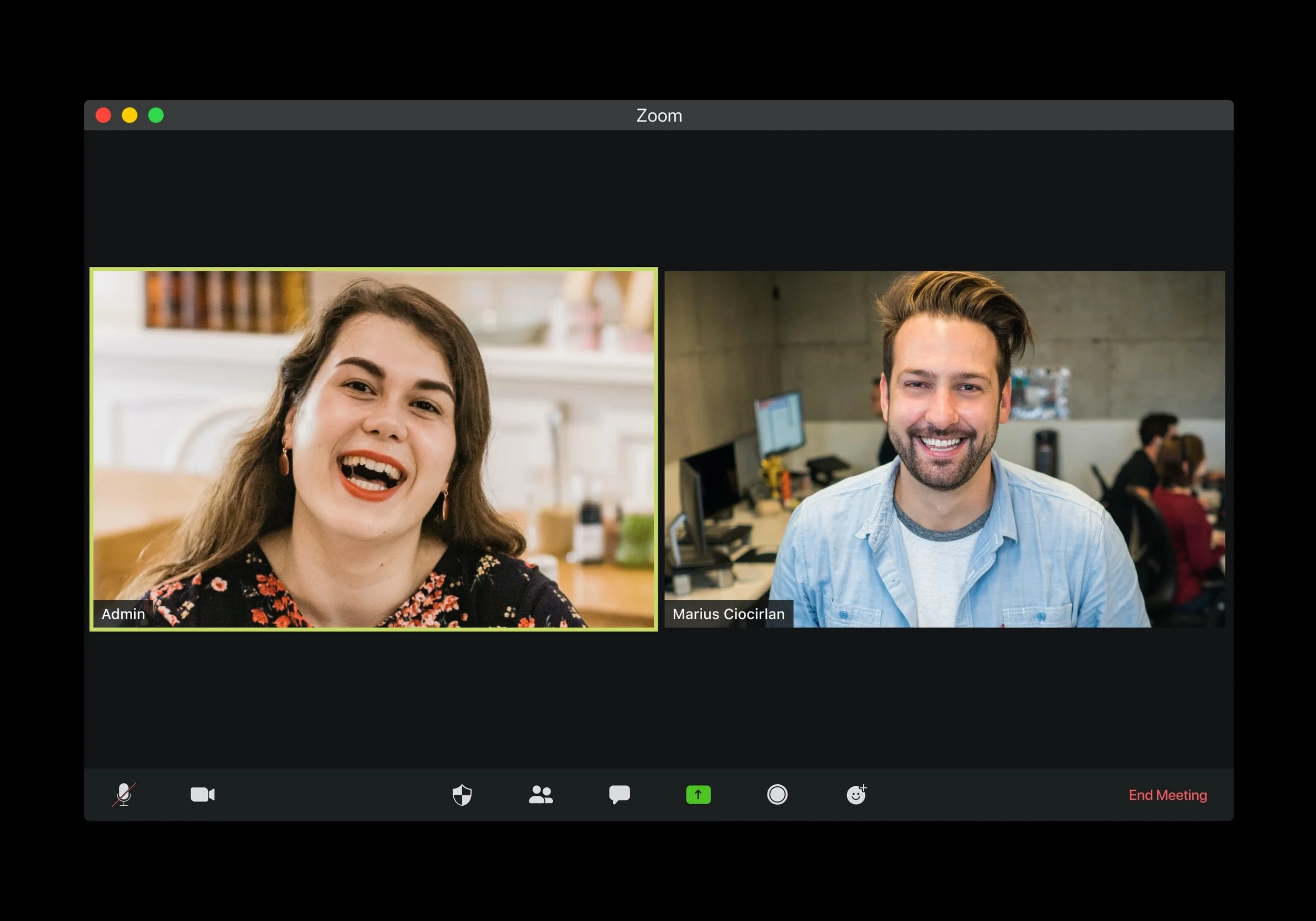
Targeting Dementia with a Remote Social Intervention
A moderated, experimental study to determine whether technology-assisted social engagement can protect against cognitive impairment.
-
Organization
Oregon Health & Science University
-
My Role
Research Associate
-
Tasks
Experimental Design, IRB Approval Coordination, Data Collection Management, Hiring and Management of Research Assistant Team
Research Question:
Can social engagement protect against cognitive decline?
Result:
Yes.
Why does this matter?
Despite dedicating millions of dollars a year to develop medication for dementia, we are not much closer to an effective treatment.
Loneliness and isolation are also often hallmarks of aging.
Creating an effective social engagement “treatment” that might increase cognitive flexibility is low-risk and high-reward.
Stakeholders
We needed to consider the perspectives of several organizations and groups were instrumental in supporting this work:
The National Institute of Health funded this study with the expectation that it would contribute to medical advances in treating age-related dementia.
Expectations: Publications, rigorous primary research
Caregivers and family members of those at risk for dementia contributed time and energy to support this research and potential outcomes.
Expectations: Meaningful results that could improve treatment for their loved ones
Over 80 senior volunteers from our community who are invested in living independently as long as they can volunteered to participate in this extensive study.
Expectations: Time spent in support of this research will be effective, parsimonious, and safe
Participant Persona
We conducted an initial feasibility survey to determine willingness of local seniors to participate in a computer-based social engagement protocol. We received over 1000 survey responses (approximately 50% rate of return).
From the survey data, we determined that willing intervention participants would likely fit the following persona:
Initial Assumptions
We developed the study methods based on several assumptions derived from literature reviews of related prior research.
We know that social engagement is a neurologically demanding cognitive exercise because it requires the synthesis of several complex cognitive tasks.
If a person increases this “exercise”, neurological flexibility may also strengthen and increase (much like exercising a muscle), mitigating other factors potentially contributing to cognitive decline.
Specifically, we know that social engagement requires at least these three cognitive tasks:
-
Attention
The ability to choose and focus on relevant stimuli.
Example: Listening for your name to be called out when a drink is ready at a cafe.
-
Executive Function
The ability to use working memory, flexible thinking, and self-control to plan and execute tasks.
Example: Making sure your alarm is set early enough to wake up, get ready, and get to work on time.
-
Abstract Reasoning
The ability understand and think about complex concepts that are not tied to concrete experiences, objects, people, or situations.
Example: Discussing economic theory.
Hypothesis
Based on our research question, assumptions, and stakeholder needs, we determined that:
A simple intervention to increase social engagement (or cognitive exercise) could result in maintenance or improvement in neuropsychological test scores over time, compared to a control group.
Intervention Design
Since social engagement is so complex, we were facing two major challenges in testing this hypothesis:
Social engagement is a nebulous concept - we would need a very specific operational definition of “Social Engagement” in order to draw any conclusions.
Since so many factors can impact cognitive flexibility, we would need to control mitigating factors as much as possible - otherwise we wouldn’t be able to conclude that it was really an increase in social engagement that produced a statistical effect.
In addition, based on our Participant Persona, we determined that our study design and intervention would be most effective if it met the following parameters:
Remote - Allowing participants to connect from their own homes, without needing to travel to a lab (to increase likelihood of protocol adherence)
Authentic - Facilitating genuine relationality rather than a scripted or test-based interaction (to make it feel meaningful to participants)
Easy to Use - Utilizing simple technical solutions that would not require above-average skill - for this, we developed our own in-house video chat software with only the minimum necessary features (due to limited technical savvy among our target participant population)
Study Design
After extensive consideration of the needs of our stakeholders, the research premise, and participant limitations, we determined that our experimental design would need to be a short-duration, randomized, controlled, experimental clinical trial.
A Note About Authenticity
For our social engagement intervention to feel like a real interpersonal connection, we included the following components in our research design:
Webcams placed at eye-level to simulate eye contact from facilitator to participant
A consistent facilitator for each participant throughout the entire intervention to promote rapport development over time
A series of daily prompts designed to elicit self-disclosure, which is shown to enhance rapport
Facilitator- and participant-side surveys assessing subjective rapport for each social engagement session to validate that the social engagement was indeed creating a feeling of connectedness
Methods and Data Collected
-
Neuropsychological test scores collected before, after, and at follow-up
Clinical Dementia Rating scale scores
Word counts of daily conversations (both total and proportional to facilitator)
Daily perceived rapport ratings from both participant and facilitator
Initial demographic and behavioral survey data
-
Daily 30-minute, free-form conversations intended to elicit self-disclosure and rapport building
Long-form, written survey questions assessing rapport and participant experience
Findings
The social-engagement intervention group maintained cognitive gains in semantic fluency (how quickly you can generate ideas) more effectively than the control group.
This finding was limited to those with healthy cognition, which is most likely because this Phase I study was not powered to see changes in the cognitively impaired group.
Semantic Fluency Scores
Conclusions
Noteworthy Findings
Even with just a 6-week trial, it appears that our social engagement protocol improved cognitive fluency when compared to the control group.
These results persisted at follow-up, even though the social engagement protocol had been complete for 12 weeks.
There are numerous computerized cognitive inventions being studied, but very few effective social engagement interventions. There is opportunity for expanding this trial and protocol based on these findings.
Limitations
Social engagement is a complex process - more standardization is always possible.
We did not find a difference in loneliness scores in our intervention group - the intervention appeared to target cognitive improvement but not necessarily a felt sense of social support.
Our cognitive impairment group was underpowered - future work could increase sample size and focus on a less heterogeneous group.
My Role
As the primary Research Associate on this project, I worked directly with the Principal Investigator to turn her research curiosity into a clinical trial, including:
Operationalizing definitions of social engagement
Developing the experimental study design
Recruiting participants via presentations and mailings
Developing a technology strategy to accomplish seamless, rapport-building social interaction
Managing a team of research assistants and facilitators
Conducting the experimental trial
Coordinating a team to transcribe all conversations from all participants






